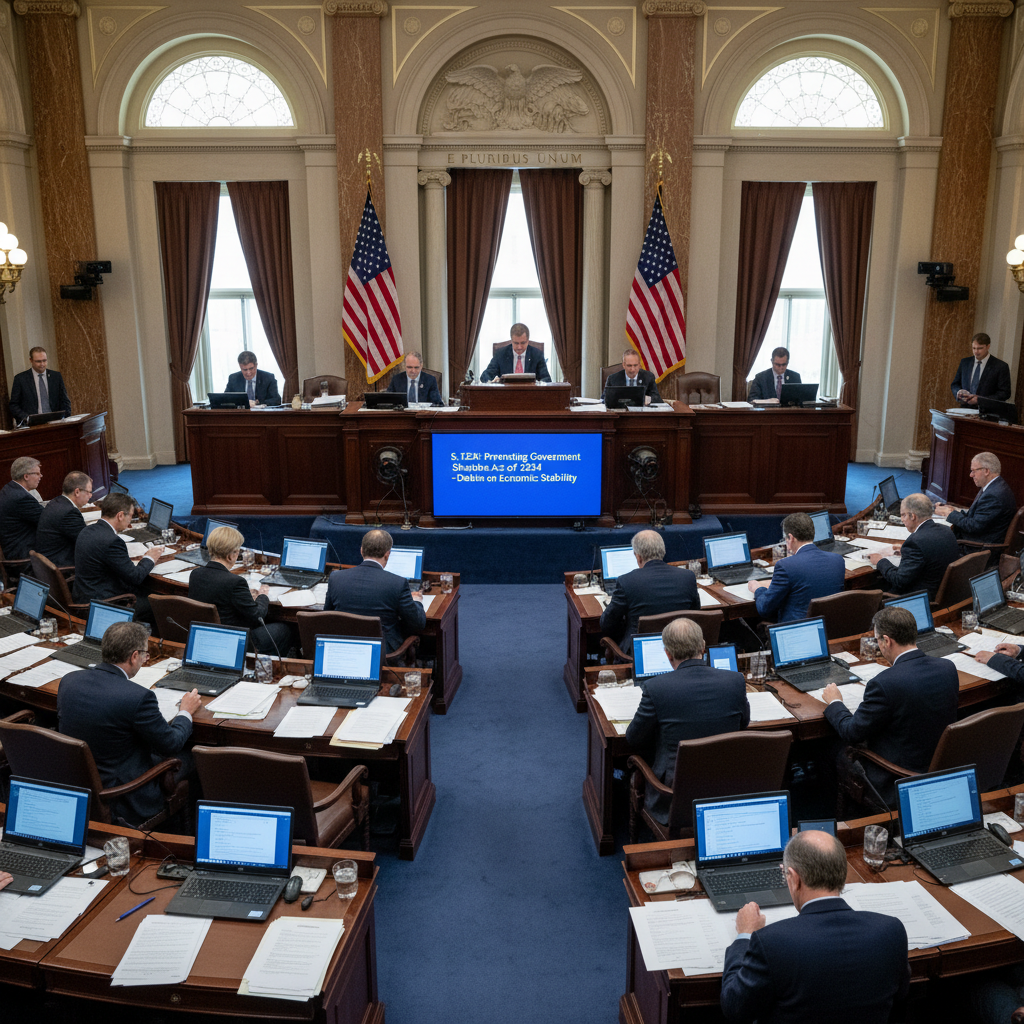
US Senate Advances Funding Bill to Prevent Government Shutdown Amid Economic Uncertainty
The US Senate has approved a funding bill to prevent a federal government shutdown, ensuring continued government operations amid economic uncertainties.
Corporate earnings from companies like Cisco and Disney reflect resilience and shifting consumer patterns.
Inflation trends show easing pressures, which may influence Federal Reserve decisions on interest rates.
Stock market volatility persists due to mixed economic signals and concerns over an AI market bubble.
Natural gas price fluctuations add complexity to the economic landscape, affecting both businesses and consumers.
Summary
Frequently Asked Questions
Q: Is the government shutdown ending soon?
A: Whether a government shutdown is ending soon depends on ongoing political negotiations and agreements in Congress. Shutdowns typically end when lawmakers pass funding bills to keep the government operational. For the most current status, it's important to follow recent news updates, as the situation can change rapidly based on legislative progress.
Q: Latest earnings reports for Cisco and Disney
A: Cisco's latest earnings report showed a quarterly revenue of approximately $14.2 billion, with strong growth in its security and software segments, reflecting ongoing demand for networking and cloud solutions. The company reported non-GAAP earnings per share (EPS) of $0.98, slightly beating analysts' expectations. Disney's most recent earnings revealed quarterly revenue of about $24 billion, driven by strong performance in its streaming services and theme parks. Disney reported an adjusted EPS of $1.09, highlighting recovery trends post-pandemic and continued investment in content and digital platforms.
Q: Impact of government shutdown on economy
A: A government shutdown can negatively affect the economy by halting non-essential federal services, delaying government payments, and reducing consumer and business confidence. Federal employees may be furloughed, leading to decreased spending and potential disruptions in various sectors such as tourism, public health, and national security. Prolonged shutdowns can slow economic growth and create uncertainty in markets, although the long-term economic impact depends on the duration and scale of the shutdown.
Q: Union Pacific and Norfolk Southern merger details
A: Union Pacific and Norfolk Southern, two of the largest freight railroads in the United States, have explored merger possibilities in the past to create a more extensive rail network. However, as of mid-2024, no finalized merger has been officially announced or approved involving the two companies. Such a merger would require extensive regulatory review by agencies like the Surface Transportation Board due to concerns about competition and market impact. The companies typically focus on strategic partnerships and operational efficiencies instead of full mergers.
Q: Current inflation and CPI data
A: Inflation reflects the rate at which the general level of prices for goods and services rises, reducing purchasing power. The Consumer Price Index (CPI) is a key indicator used to measure inflation by tracking changes in the price of a basket of commonly purchased items. As of the latest reports, inflation rates vary by country but many economies have experienced elevated inflation due to factors like supply chain disruptions and energy costs. For the most accurate and current CPI and inflation data, it's best to refer to official government sources such as the U.S. Bureau of Labor Statistics or equivalent agencies in other regions.
Key Entities
Cisco: Cisco Systems is a leading multinational technology company specializing in networking hardware, software, and telecommunications equipment. Its products and services are critical in enabling digital communication infrastructure across various industries.
Disney: Disney is a global entertainment conglomerate known for its film studios, theme parks, and media networks. The company has a significant influence on popular culture through franchises like Marvel, Star Wars, and Pixar.
Union Pacific: Union Pacific is one of the largest freight railroad networks in the United States, operating over 32,000 miles of track. It plays a crucial role in transporting goods across the western two-thirds of the country.
Norfolk Southern: Norfolk Southern is a major American transportation company specializing in freight rail services across the eastern United States. It facilitates the movement of bulk commodities, automotive products, and industrial goods.
Senate: The Senate is the upper chamber of the United States Congress, responsible for reviewing and approving legislation, treaties, and federal appointments. It consists of 100 members, with two senators representing each state.
External articles
- The government shutdown is now the longest - and likely ...
- Economic Impacts of the Federal Government Shutdown ...
- Government Shutdown Clock
Articles in same category
- Bitcoin Price Volatility and UK FCA Regulation Impact on Crypto Investments
- ASML, United Airlines & American Express Drive Growth via Innovation and Premium Segments
- British Red Telephone Box: Icon of Heritage, Design, and Innovation
YouTube Video
Title: Senate takes first step toward ending the government shutdown
URL: https://www.youtube.com/shorts/tiHjNrU0x94
Finance
